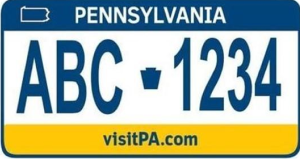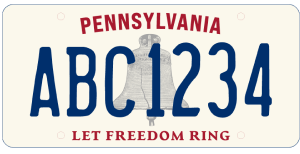A Pennsylvania license plate lookup provides access to critical vehicle details. When a vehicle is registered in the state, its data is stored and can be accessed using the license plate number.
This shows registration, title details, mileage, and odometer readings. Motorists can also verify the vehicle’s primary specifications, accident history, and maintenance records.
Such information is valuable for many reasons. For instance, motor vehicle theft and fraud have risen by 55% and 43% in Pennsylvania over the past decade, according to the Pennsylvania Commission on Crime and Delinquency (PCCD).
License plate lookups help reduce these risks. Potential buyers can check accident histories, title brands, and lien records to avoid risky purchases or prevent the purchase of stolen vehicles.
Why Run a License Plate Search in Pennsylvania?
Here are several reasons why individuals and organizations conduct Pennsylvania license plate lookups:
- Determine a vehicle's market value and long-term costs.
- Check if the car was previously used for particular purposes, indicating wear and tear.
- Identify title brands, like salvage, that may require negotiation.
- Assess accident records to gauge damage severity.
- Build buyer confidence by disclosing vehicle conditions.
- Verify registration accuracy with the Pennsylvania Department of Transportation (PennDOT).
- Track debtors using license plate numbers.
Is it Legal to Perform a License Plate Lookup in Pennsylvania?
Pennsylvania’s Right-to-Know Law (RTKL) allows public access to driver and vehicle records through license plate lookups, making such searches legal. However, agencies must confirm the record’s existence, verify its public status, and apply exemptions or redactions before releasing it.
While the RTKL grants access, it doesn’t override the federal Driver’s Privacy Protection Act (DPPA), which restricts the disclosure of personally identifiable information (PII).
Title 67 of the Pennsylvania Code (67 Pa. Code) Section 95.2(a) reinforces this limitation. The law requires written consent from the vehicle owner or a notarized statement proving a legitimate business to access personal information from driver or vehicle records.
Below are the legally permissible uses of personal information obtained through license plate lookups in Pennsylvania:
- Law enforcement and courts use vehicle data for official duties.
- Agencies manage vehicle safety, theft, and recalls.
- Organizations verify personal information to prevent fraud.
- Legal professionals rely on data for civil and criminal cases.
- Researchers utilize anonymized data for statistical analysis.
- Insurers process claims using this information.
- Authorities notify vehicle owners of towed or impounded vehicles.
- Toll operators use data for efficient toll collection.
Improper PII use or disclosure can lead to 18 months to five years in prison and fines between $500,000 and $1,000,000.
How Can You Conduct a Pennsylvania License Plate Lookup?
Pennsylvania license plate lookups can be conducted through state-approved methods or authorized data providers for vehicle information retrieval.:

State DMV (Pennsylvania Department of Transportation)
Although some motor vehicle departments from other states may offer license plate lookups for retrieving driver or vehicle information, the Pennsylvania Department of Transportation (PennDOT) does not provide such services. This means that individuals cannot obtain driver or vehicle details solely by using a license plate number.
To verify the availability of such services or inquire about related information, individuals can visit a local PennDOT Driver and Vehicle Services (DVS) office, contact PennDOT’s Central Office, or check the official PennDOT website.

Approved NMVTIS Data Providers
Individuals and businesses can perform Pennsylvania license plate lookups through authorized NMVTIS (National Motor Vehicle Title Information System) data providers like GoodCar.com, InfoTracer, Recordsfinder.com, and StateRecords.org.
These vendors source driver or vehicle information from reputable private and public databases. They offer a quick and convenient process. Users simply need a smartphone or computer with internet access to enter the plate number, select Pennsylvania, and click "Search."
However, more comprehensive vehicle details may come at higher costs through these lookups.
What Information Can You Obtain from a Pennsylvania License Plate Lookup?
Pennsylvania license plate searches offer basic and comprehensive vehicle reports to help users verify information about a vehicle.
Basic Reports
Vehicle owners can access free, basic vehicle reports to verify the identity and essential details of the vehicle in question. These details include:
- Make
- Model
- Year
- Vehicle type (car, truck, motorcycle)
- Body style (sedan, SUV, coupe, hatchback, convertible)
- Engine size
- Color
- Trim level
- Fuel type (diesel, gasoline, diesel, hybrid, electric)
- Transmission type (automatic, manual)
- Drivetrain
- Tire specifications
- Safety ratings
Comprehensive Reports
Comprehensive vehicle reports are typically paid, in-depth reports that answer important questions that car buyers often have. Comprehensive vehicle history reports obtained using license plate numbers reveal the following information:
- Registration status: Indicates if registration is valid or expired.
- Title status: Indicates if the title is clean, salvage, rebuilt, or gray market.
- VIN (Vehicle Identification Number): Confirms the official VIN to detect tampering.
- Maintenance history: Summarizes past inspections and services.
- Vehicle blacklist: Identifies vehicles linked to legal issues.
- Crashes and repairs: Outline accidents and damage extent.
- Recall history: Confirms issued recalls and resolutions.
- Lien records: Show any outstanding loans on the vehicle.
- Mileage: Lists the last recorded mileage for assessment.
Generally, Pennsylvania license plate lookup reports omit sensitive personal details, including the owner's identification, address, and medical or disability information.
Pennsylvania laws safeguard personal details in the state’s vehicle records to ensure confidentiality in accordance with the DPPA. These protections are outlined in Title 75 of the Pennsylvania Consolidated Statutes (75 Pa. C.S.) Section 6114 and Title 67 of the Pennsylvania Code (67 Pa. Code) Section 95.2(c).
Access to personal information is restricted to individuals or entities with legitimate purposes, like employers or insurers.
What Does a Pennsylvania License Plate Look Like?
When conducting a license plate search, individuals should make sure that the plate is from Pennsylvania and not from another state.
PennDOT issues standard license plates measuring 12 by 6 inches and featuring a white background with blue, yellow, and white bars.
The current design, introduced in June 2017, showcases "PENNSYLVANIA" in bold on a dark blue background, a seven-character registration number in blue separated by a blue keystone symbol, and a yellow bar with the state’s tourism website, "visitPA.com."
In 2025, PennDOT will roll out a new design featuring the Liberty Bell and the phrase "Let Freedom Ring." Pennsylvania Governor Josh Shapiro remarked that this plate will celebrate the state’s heritage and remind the nation of the importance of freedom as the U.S. approaches its 250th birthday in 2026.
Motorists can sign up for email updates on PennDOT's website to learn when the new plates will be available.

The current Pennsylvania license plate features a blue, white, and yellow design with a keystone symbol.

The upcoming "Let Freedom Ring" plate will feature the Liberty Bell on a white background. This reflects a shift from tourism-friendly branding to a stronger emphasis on patriotism and freedom.

License Plate Types in Pennsylvania
License plate types affect lookups. For example, special organization plates allow quick identification for law enforcement, while personalized plates, due to their unique formats, can complicate searches.
Aside from standard-issue plates, the following are the major types of Pennsylvania license plates:
- Military Plates: Veterans and service members can obtain military plates by submitting discharge papers or a military ID.
- Special Organization Plates: Nonprofits can offer plates through the Special Organization Plate Program by meeting the criteria and securing enough applicants.
- Personalized Plates: Motorists should avoid combinations on PennDOT’s "Do Not Issue" list and check availability with the Personalized Registration Plate Availability tool.
Visit PennDOT's Registration Plates page for information on all available plate options.
Frequently Asked Questions (FAQs)
The following discussion addresses FAQs regarding Pennsylvania license plate lookups:
Can I Look Up PA License Plates for Free?
PennDOT does not provide free license plate lookup services, but several third-party organizations do. However, free lookups often yield limited and outdated vehicle information. Conversely, paid services offer comprehensive and accurate data. This includes meticulously verified and maintained accident reports, recall details, and market value assessments.Do All Pennsylvania License Plate Lookups Work for Custom or Personalized Plates?
Personalized license plate lookups in Pennsylvania can be problematic due to variations in spelling and formatting. These discrepancies often lead to confusion and make it difficult to locate specific plates. For example, a plate may be entered incorrectly, or subtle differences in character arrangement may prevent accurate searches.How Long Does a Typical Pennsylvania License Plate Lookup Take?
Third-party vehicle history report providers can process Pennsylvania license plate lookups in real-time, typically delivering results within just a few minutes to a couple of hours. Factors such as data availability, system performance, network speed, and the complexity of the request can affect this duration.Can I Perform Bulk License Plate Lookups in Pennsylvania?
A bulk license plate lookup is not available through PennDOT. However, businesses that need driver or vehicle histories for employment or insurance purposes can sign up for an Online Business Driver History Request Service account and pull up to 25 records at a time. Commercial websites may offer bulk lookups but are still subject to federal and state laws.Are There Any Alternatives to a License Plate Lookup for Obtaining Vehicle Information in Pennsylvania?
PennDOT offers alternatives to license plate lookups, which require a VIN for data access. Non-certified records can be obtained through the Individual Driver Records portal at PennDOT's Online Services Center.For certified records, individuals must submit a completed Request for Driver Information (Form DL-503) or Request for Vehicle Information (Form DL-135) by mail or in person to the address specified on the form. Additionally, authorized providers like StateRecords.org, Recordsfinder.com, GoodCar.com, and InfoTracer offer VIN lookup services.
